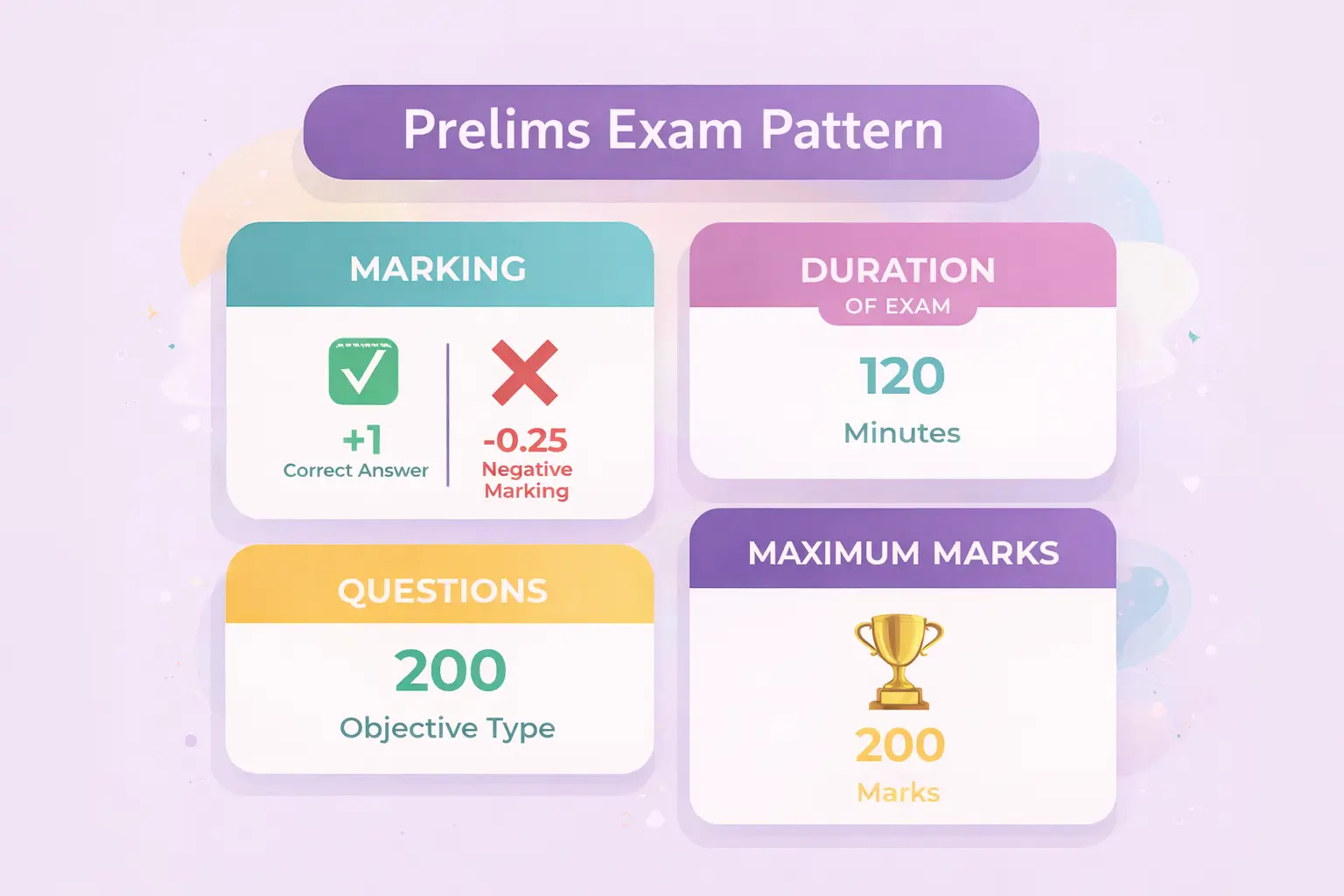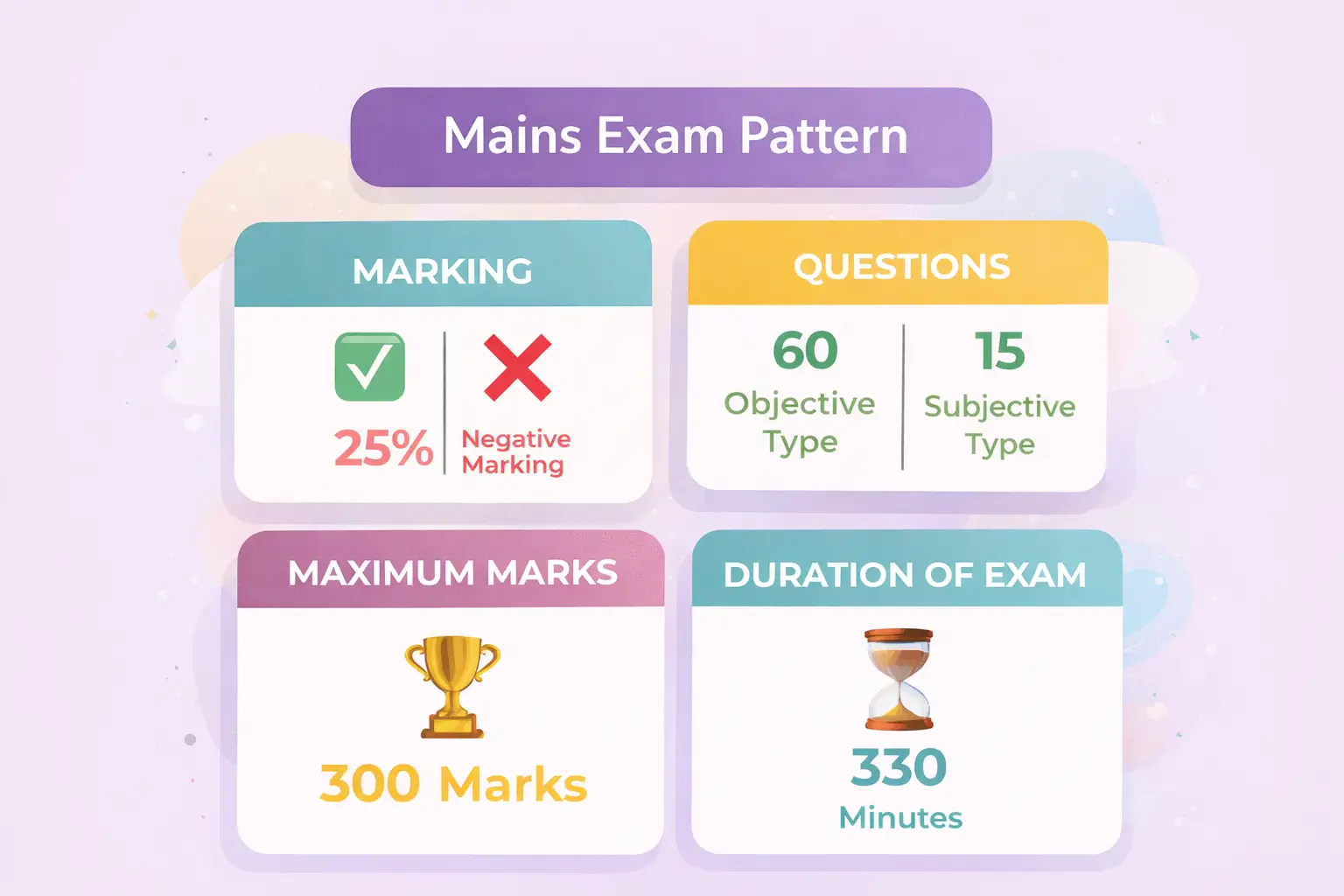The RBI Grade B syllabus for DR (General) includes 3 subjects: English Language, Reasoning Ability, Quantitative Aptitude, and General Awareness (Current Affairs + Banking focused) in the Phase 1 (Prelims) exam. The Phase 2 (Mains) exam consists of 3 papers: (i) Economics & Social Issues (ESI), (ii) Descriptive English (Writing), and (iii)Finance & Management (FM).
RBI Grade B is the toughest banking exam in India with the highest perks. If you are planning to prepare for the RBI Grade B 2026 exam, you need to be aware of the detailed syllabus and exam structure, which is given below.
RBI Grade B Syllabus 2026
Before preparing for the exam, candidates must be aware of the RBI Grade B syllabus topics, pattern, mode of exam, type of questions, and the time duration. Check all importants points below.
| RBI Grade B Syllabus and Exam Pattern 2026- Summary | |
| Bank | Reserve Bank of India (RBI) |
| Exam Name | RBI Grade B 2026 |
| Vacancies | 120 |
| Type of Exam |
|
| Mode of Exam | Online |
| Total Marks |
|
| Total Questions |
|
| Negative Marking |
|
| Selection Process | General- Prelims, Mains and Interview DEPR/DSIM- Online/ Written Examination and Interview |
| Official website | www.rbi.org.in |
RBI Grade B 2026 Selection Process
There are three types of posts in the RBI Grade B exam. The RBI Grade B Exam selection process involves several stages, each designed to test different aspects of a candidate's knowledge and skills. Each post has its own selection process, which is as follows-
- For RBI Grade B DR (General)- Prelims, Mains and Interview
- For RBI Grade B- DEPR- Online/ Written Examination and Interview
- For RBI Grade B- DSIM- Online/ Written Examination and Interview
The detailed syllabus for all 3 posts is given below.
RBI Grade B Syllabus 2026 for DR (General)
To appear for the RBI Grade B Exam, all the candidates need to know the RBI Grade B syllabus and exam structure, which is discussed below for Prelims & Mains in detail.
RBI Grade B Prelims Syllabus for DR (General)
The preliminary examination of the RBI Grade B exam 2026 will comprise Reasoning Ability, Quantitative Aptitude, English Language and General Awareness. Here is the detailed RBI Grade B Prelims syllabus:
| Section Asked | No. of Questions | Maximum Marks | Duration |
| General Awareness | 80 | 80 | 25 minutes |
| Quantitative Aptitude | 30 | 30 | 25 minutes |
| English Language | 30 | 30 | 25 minutes |
| Reasoning | 60 | 60 | 45 minutes |
| Total | 200 | 200 | 120 minutes |

RBI Grade B Reasoning Syllabus
- Logical Reasoning
- Alphanumeric Series
- Ranking/Direction/Alphabet Test
- Data Sufficiency
- Coded Inequalities
- Seating Arrangement
- Puzzle
- Tabulation
- Syllogism
- Blood Relations
- Input Output
- Coding Decoding
RBI Grade B Reasoning Syllabus
- Simplification
- Profit & Loss
- Mixtures & Alligations
- Simple Interest & Compound Interest & Surds & Indices
- Work & Time
- Time & Distance
- Mensuration – Cylinder, Cone, Sphere
- Data Interpretation
- Ratio & Proportion, Percentage
- Number Systems
- Sequence & Series
- Permutation, Combination &Probability
RBI Grade B English Syllabus
- Reading Comprehension
- Cloze Test
- Para jumbles
- Miscellaneous
- Fill in the blanks
- Multiple Meaning /Error Spotting
- Paragraph Completion
RBI Grade B General Awareness Syllabus
- Current Affairs
- Indian Financial Systems
- Indian Banking Systems
- Monetary Plans
- National Institutions
- Banking Terms
RBI Grade B Mains Syllabus 2026 for DR (General)
| Sections / Subjects | No. of Questions | Maximum Marks | Duration (minutes) |
| Paper I: Economics and Social Issues |
| 50 Total-100 | 30 minutes Total-120 minutes |
| Paper II: English (Writing Skills) |
| 100 | 90 minutes |
| Paper III: Finance and Management |
| 50 Total-100 | 30 minutes Total-120 minutes |

The Mains Examination of the RBI Grade B exam 2026 will constitute 3 sections: Economic & Social Issues, Finance and Management. The complete syllabus is discussed below:
| RBI Grade B Mains Syllabus for DR (General) | |
| Subject | Syllabus |
| Paper 1- Economic & Social Issues | 1. Growth and Development
2. Indian Economy
3. Globalization
4. Social Structure in India
|
| Paper 2- English | To analyse the writing skills of the candidates including expression and understanding of the topic |
| Paper 3 (a) Finance | 1. Financial System
2. Financial Markets
3. General Topics
|
| Paper 3 (b)- Management | 1. Fundamentals of Management & Organizational Behaviour
2. Ethics at the Workplace and Corporate Governance
|
RBI Grade B Exam Pattern 2026- Click to Check
RBI Grade B DEPR Syllabus 2026
| Phase | Paper | Marks | Duration |
| Phase I (Objective) | Paper-I Economics | 100 | 120 minutes |
| Paper - II English - Descriptive (To be typed with help of keyboard) | 100 | 120 minutes | |
| Phase II (Descriptive) | Paper-II Economics | 100 | 180 minutes |
| Paper-III English | 100 | 90 minutes | |
| Total | 400 | ||
The syllabus for RBI Grade B (DR) DEPR is designed as per the job profile, which includes primarily undertaking economic analysis and research and contributing to policy formulation, apart from a compilation of data relating to select sectors.
| RBI Grade B Syllabus for DEPR | |
| Paper I: Economics Related | based on the Master’s Degree examination in Economics |
| Paper-II: Economics Related | based on the Master’s Degree examination in Economics |
| Paper III: English | The English paper will be framed to assess the candidates’ writing skills, expression, and understanding of the topic |
RBI Grade B DSIM Syllabus 2026
| Phase | Paper | Marks | Duration |
| Phase I (Objective) | Paper-I Statistics | 100 | 120 minutes |
| Phase II (Descriptive) | Paper-II Statistics (Descriptive) | 100 | 180 minutes |
| Paper-III English (Descriptive) | 100 | 90 minutes | |
| Total | 300 | ||
RBI Grade B Syllabus for DR- DSIM has been discussed below for Papers 1, 2, and 3 as mentioned by RBI.
| RBI Grade B Syllabus for DSIM | |
| Paper I: Statistics (Objective) | Probability
|
| Paper-II: Statistics (Descriptive) |
|
| Paper III: English (Descriptive) | The English paper will be framed to assess the candidates’ writing skills, expression, and understanding of the topic |
RBI Grade B Interview Round
This is the final round of the selection process. In the interview round, they test your knowledge of finance and economics, along with your personality assesment communication, and problem-solving skills.
The Interview will be of 75 marks for each post (General, DEPR & DSIM). Candidates will be shortlisted for the interview based on an aggregate of marks obtained in the Mains Exam. Candidates may opt for an interview either in Hindi or English. The final Selection will be through a merit list, which will be prepared by adding marks secured by candidates in the Phase-II examination and interview.
Besides the preliminary exam and the main exam, an interview process is also conducted for candidates who qualify for the first two phases of the RBI Grade B Officer Exam.
The final merit list is made on the basis of marks obtained by a candidate in his/ her main exam and interview process.
